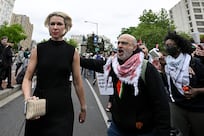Japan's trade minister is to meet Abu Dhabi's top oil officials as the country seeks to maintain its position as the emirate's top crude customer.
Yukio Edano is scheduled to meet the head of the emirate's oil company and Sheikh Mohammed bin Zayed, the Crown Prince of Abu Dhabi and Deputy Supreme Commander of the UAE Armed Forces, on Sunday, according to the Japanese ministry.
Japan holds concessions to pump oil from the emirate's offshore fields that begin expiring in 2018.
"Abu Dhabi should be thinking about where their future crude deliveries should be going - will it still be concentrated in Japan or will they be looking at other emerging Asian countries?" said Thaddeus Malesa, an independent Gulf energy analyst. "These concessions partners will be around for quite some time, so it's important for them to choose wisely at this stage."
The negotiations come at a sensitive time for Japan, as crude trades around the US$100 mark and the nation's reliance on imported energy grows in the wake of the accident at the Fukushima Daiichi nuclear power plant.
Japan's bill for Abu Dhabi crude imports totalled US$16 billion (Dh58.76bn) in the first half of this year, 43.3 per cent higher than in the same period last year, according to the Japan External Trade Organisation in Dubai.
"We want to have a stable relationship," said Hiroki Matsumoto, its regional managing director. "If it is fragile, it is a threat for Japanese ordinary life and production and everything."
In February, Abu Dhabi's Supreme Petroleum Council, which decides the emirate's oil policy, extended a 45-year concession to Abu Dhabi Oil Company, a Japanese consortium, that was to expire next year. The renewal not only extended the contract for another three decades but added three new reservoirs and a nearby field to the package.
"Japan has been singled out so far in the concession renegotiations," said Valerie Marcel, an associate fellow at Chatham House in Toronto. "Abu Dhabi might be inclined to maintain the concession regime when further concessions are up for renewal."
Japan Oil Development Company, a subsidiary of the Japanese producer Inpex, holds a 12 per cent stake in four fields in Abu Dhabi's biggest offshore concession and a 40 per cent stake in another field, all of which expire in the next seven years.
Abu Dhabi hopes to sign on partners with the right technologies as it seeks to bring its pumping capacity from 2.8 million barrels per day (bpd) to 3.5 million bpd - goals that may require a change to the emirate's notoriously tight terms, which pay $1 a barrel to international oil companies.
"None of this can really be realised unless they have partners who think the same way and are willing to invest alongside them," said Mr Malesa. "They know that they have to alter the payment terms in the future, especially if they want these partners to increase investment substantially."
The trade ministry said Mr Edano was scheduled to meet Salem Al Dhaheri, the secretary general of the Supreme Petroleum Council, in Abu Dhabi and the following day with Ali Al Naimi, the oil minister of Saudi Arabia, Japan's top supplier.




